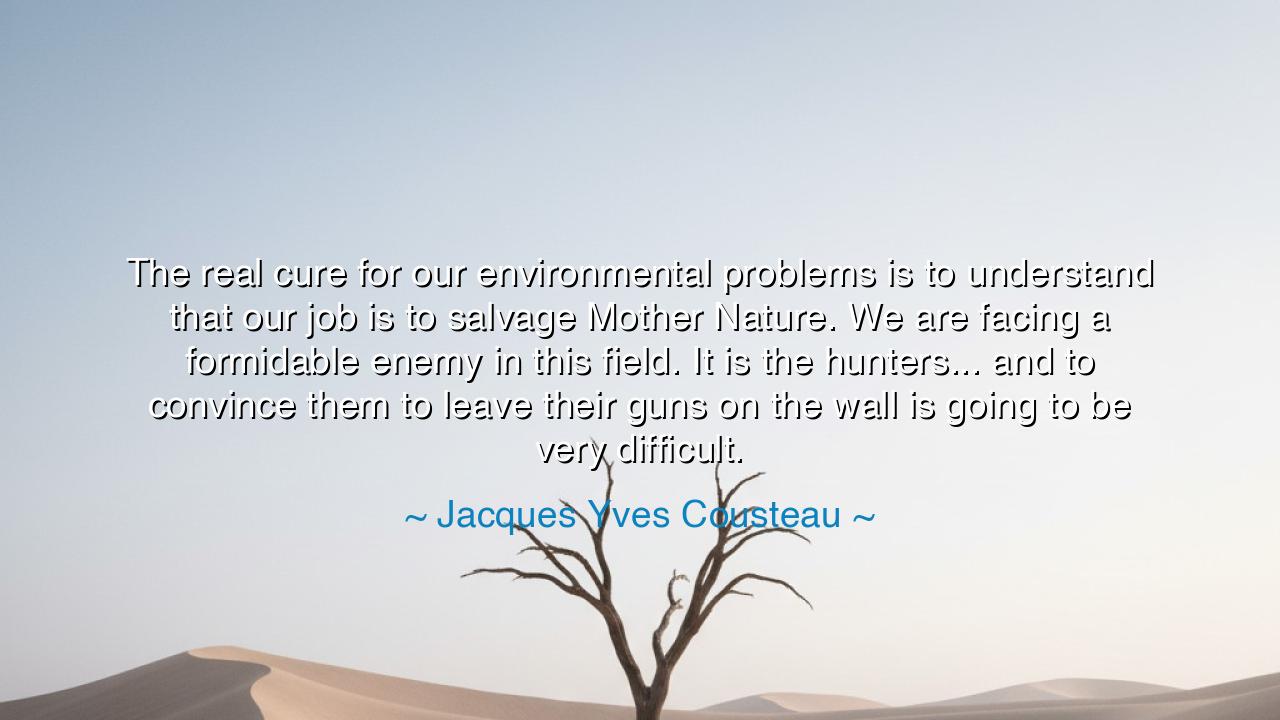
The real cure for our environmental problems is to understand
The real cure for our environmental problems is to understand that our job is to salvage Mother Nature. We are facing a formidable enemy in this field. It is the hunters... and to convince them to leave their guns on the wall is going to be very difficult.






When Jacques Yves Cousteau spoke the words, “The real cure for our environmental problems is to understand that our job is to salvage Mother Nature. We are facing a formidable enemy in this field. It is the hunters... and to convince them to leave their guns on the wall is going to be very difficult,” he was not merely describing a battle for the earth’s survival—he was describing a struggle for the soul of humankind. In his voice was both sorrow and conviction, for he had seen the beauty of the deep seas, the grace of the creatures that dwelled there, and the destruction wrought by human hands. His words are both warning and commandment: that we must cease to act as conquerors of the natural world and begin to live as its guardians.
The origin of this truth lies in the life of Cousteau himself—a man who explored the oceans not as a plunderer but as a pilgrim. For decades, he sailed the waters of the world aboard his ship, Calypso, revealing to humanity the hidden wonders beneath the waves. He showed us coral kingdoms and forests of kelp, the slow dance of whales and the flicker of bioluminescent life in the dark abyss. Yet the deeper he journeyed, the more he saw how fragile it all was. The seas were dying—not by accident, but by deliberate hand. The hunters of his time were not only those with rifles and harpoons, but also those who extracted, polluted, and consumed without reverence.
To salvage Mother Nature, as Cousteau declared, is no small task. It is a sacred duty, requiring not just science but humility. Humanity has long imagined itself as master of the earth, yet in truth, we are but children playing with forces beyond our wisdom. We take from the soil, from the air, from the water—believing that nature’s generosity is infinite. But the earth is not a treasury without end; it is a living being that bleeds when wounded. Cousteau knew this, and his words carried the weight of one who had witnessed the decline of the living sea—reefs turned to stone, whales slaughtered for vanity, and shores poisoned by the waste of progress.
Consider the tragedy of the whaling industry in the early twentieth century. For centuries, humanity hunted these giants of the ocean, first with harpoons and later with steel ships and engines of death. By the 1960s, entire species teetered on the edge of extinction. It was through the voices of men like Cousteau that the world began to awaken. His documentaries showed whales not as commodities, but as sentient beings—mothers, singers, navigators of the deep. The movement to protect them began when people could see and feel what was being lost. From destruction arose understanding; from understanding, change. But even now, the struggle continues, for the hunter’s instinct—the urge to dominate—still lingers in the human heart.
Cousteau’s reference to the hunters reaches beyond those who stalk animals; it speaks to a mindset—a blindness of spirit that treats the world as property rather than kin. The hunter, in this sense, is anyone who exploits without conscience, who views nature as a quarry instead of a companion. To leave their guns on the wall means more than ending the hunt; it means laying down arrogance, greed, and indifference. It means choosing restraint where once there was desire, compassion where once there was conquest. This is the transformation Cousteau sought—not of the wilderness, but of humanity itself.
Yet, he was no fool. He knew that this transformation would not come easily. “It will be very difficult,” he said, and indeed, it is. For to protect the earth requires sacrifice: to consume less, to profit less, to take responsibility for what we destroy. It means changing not just our habits, but our hearts. The war for the environment is not fought on battlefields, but in the choices of every man and woman—what we eat, what we waste, what we defend. Each act of care, each refusal to harm, is a blow against the enemy of apathy.
Thus, the lesson of Cousteau’s words endures: our task is not to rule nature, but to restore her. We must see ourselves as healers, not hunters. The forests and seas are not separate from us—they are the lungs and lifeblood of our own being. If we destroy them, we destroy ourselves. But if we choose to protect them, to salvage Mother Nature, then perhaps we will find salvation as well.
Let future generations remember this: the earth does not need our dominion—it needs our devotion. To leave our guns on the wall is to silence the noise of destruction and listen again to the music of life—the whisper of leaves, the song of whales, the voice of wind across the waters. Only when we learn to love this harmony more than conquest will we prove ourselves worthy of the world that gave us birth.






AAdministratorAdministrator
Welcome, honored guests. Please leave a comment, we will respond soon